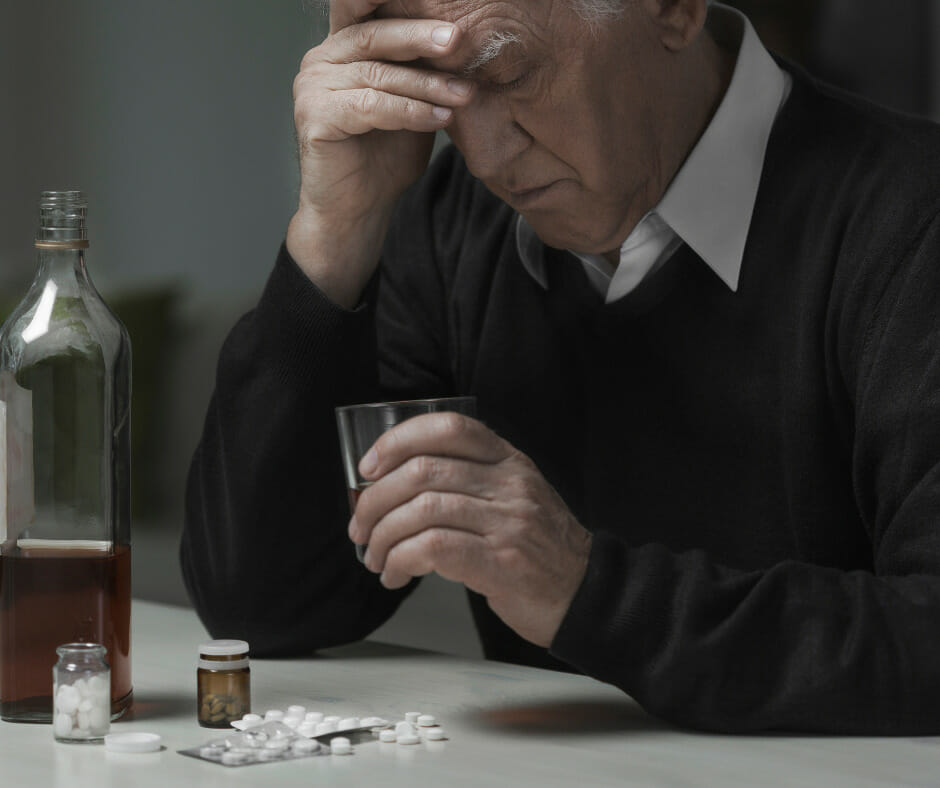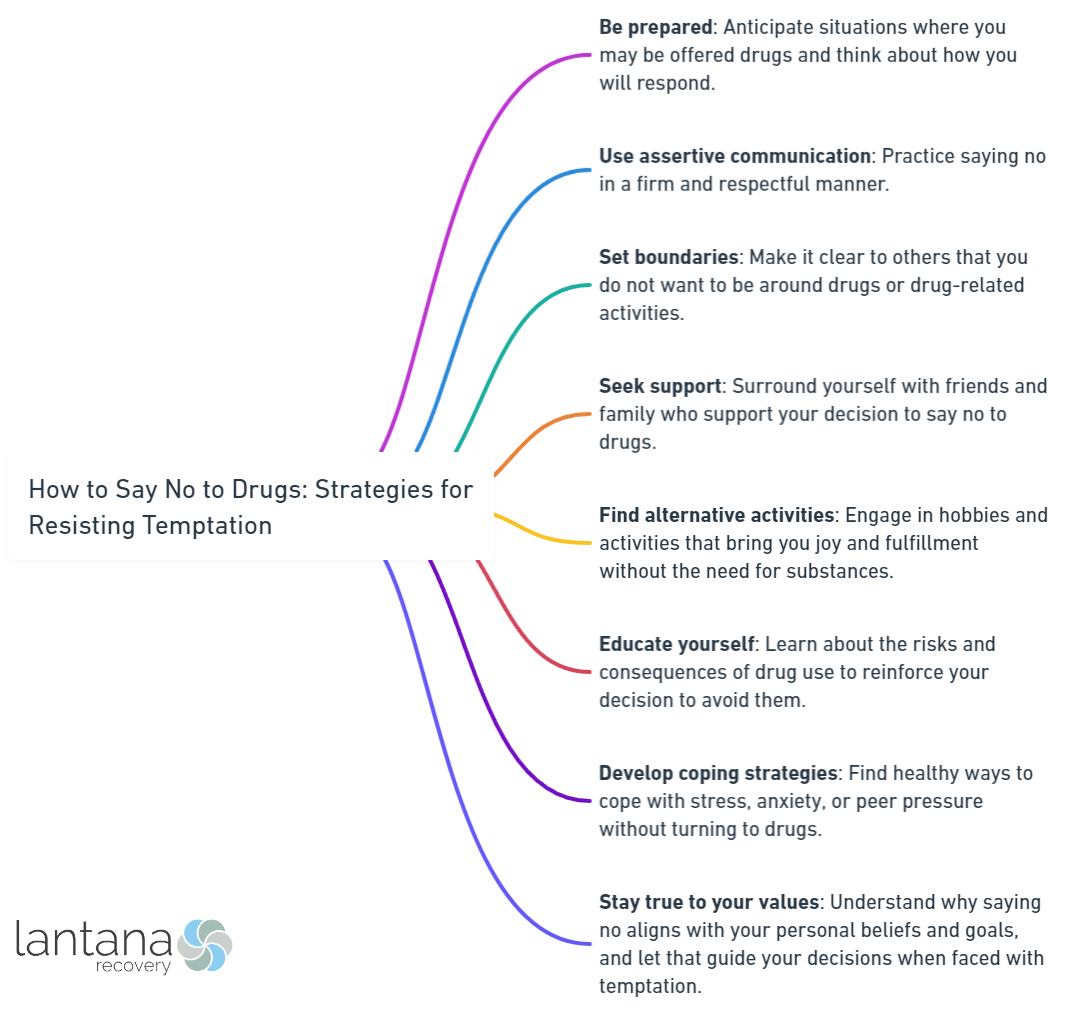Saying no to drugs is a critical skill that everyone should possess. Understanding the importance of resisting the temptation to use drugs is paramount in maintaining a healthy and fulfilling life. The influence and allure of drugs can be strong, often fueled by factors such as peer pressure and media messages.
Building strong personal values is one such strategy that helps individuals make informed decisions and stay committed to a drug-free life. Surrounding oneself with positive influences, such as supportive friends and family, can provide a strong support system and serve as a constant reminder of the importance of staying drug-free.
Developing effective communication skills is another valuable strategy for saying no to drugs. Clear and assertive communication allows individuals to set boundaries and say no confidently when faced with drug-related temptations. Seeking support from trusted friends and family members can offer guidance and reinforce positive choices.
It is essential to have strategies in place for dealing with difficult situations. Handling peer pressure, coping with stress and emotional triggers, avoiding risky environments, and finding healthy alternatives are all key components of resisting drug temptation.
In some cases, getting help and support from outside sources may be necessary. Reaching out to a trusted adult, such as a parent, teacher, or counselor, can provide guidance and a safe space to discuss concerns. Seeking professional and joining support groups and programs specifically designed to address drug-related issues can also greatly assist individuals in their journey toward saying no to drugs.
By understanding the importance of saying no to drugs and implementing effective strategies to resist temptation, individuals can safeguard their well-being, make positive choices, and lead drug-free life.
The Importance of Saying No to Drugs
Saying no to drugs is vital for maintaining a healthy and fulfilling life. Refusing to use drugs can have numerous positive effects on individuals and society as a whole.
First, saying no to drugs protects our physical and mental well-being. Drugs can severely harm our health, leading to addiction, physical deterioration, and even death. By abstaining from drugs, we can safeguard our bodies and minds from these harmful consequences.
Second, saying no to drugs enhances our personal growth and development. Drugs can hinder our ability to achieve goals, fulfill responsibilities, and pursue passions. Without drugs, we can cultivate skills, talents, and relationships, leading to a more successful and fulfilling life.
Furthermore, saying no to drugs fosters a safer and more prosperous society. Drug abuse is often linked to criminal activities, violence, and community disruption. By refusing drug use, we contribute to a safer environment for ourselves and those around us.
It is crucial to educate ourselves and others about the consequences of drug use. By raising awareness of the importance of saying no to drugs, we can inspire others to make wise choices and prioritize their well-being. Let us remember that saying no to drugs is not just an individual choice but a responsibility we have towards ourselves and society.

Understanding the Temptation to Use Drugs
Feeling the urge to experiment with drugs? In this section, let’s dive deep into understanding the temptation to use drugs. We’ll uncover the power of peer pressure and how it can sway our choices. And don’t underestimate the influence of the media, as we explore how it plays a role in shaping our perceptions and desires. Get ready to unveil the psychological forces behind drug temptation, so you can build stronger resistance strategies.
Recognizing Peer Pressure
Recognizing peer pressure is vital in resisting drug use. By being aware of how peer pressure manifests, individuals can handle these situations more effectively. Here are key signs to watch out for:
- Friends making direct or indirect suggestions to use drugs
- Feeling pressured to participate in drug-related activities or parties
- The temptation to fit in or be accepted by a specific social group
- Fear of rejection or isolation if you don’t conform
- Feeling uncomfortable or conflicted about the situation
Recognizing peer pressure is the initial step in resisting it. Understanding your ability to make choices regardless of others is essential. Developing strong personal values and surrounding yourself with positive influences can empower you to confidently refuse. Building effective communication skills and setting boundaries can also help navigate difficult situations without succumbing to peer pressure.
By recognizing peer pressure and taking proactive steps to resist it, you enhance your well-being and proficiency in making informed decisions.
Understanding the Influence of Media
The influence of media on drug use and temptation is significant. Media shapes our perceptions, beliefs, and behaviors, either discouraging or normalizing drug use. To resist the temptation of drugs, it’s important to understand how media influences us:
1. Portrayal of drug use: Media often glamorizes and romanticizes drug use, portraying it as cool or rebellious. Movies, TV shows, and music videos that depict drugs without consequences make drug use seem desirable. Recognizing these unrealistic portrayals helps us separate fiction from reality.
2. Influence on perceptions: Media can shape our views on drugs and their effects. Misinformation or exaggerated portrayals of drug use can create misconceptions about risks and consequences. Understanding the media’s distortion of truth helps us make informed decisions and question messages.
3. Influence on peer norms: Media can affect what we consider normal or acceptable behavior. If the media constantly portrays drug use as prevalent and socially acceptable, it creates a perception that everyone does it. Recognizing the media’s impact on peer norms helps us resist conformity pressure.
4. Advertising and marketing: Drug companies use media to promote their products as solutions to problems. Pharmaceutical ads can normalize drug use and create a false sense of need. Being aware of the influence of advertising and marketing helps us critically evaluate messages.
5. Educational opportunities: Media can educate us about the dangers of drug use and promote prevention efforts. Public service announcements, documentaries, and news stories help us understand the real-life consequences of drug use.
Understanding the media’s influence is crucial in resisting drug use, especially in teens and adolescents. According to Elizabeth Tucker, a pediatric resident at the John Hopkins University, “Influences for adolescents include their parents and peers, but also so-called “super peers” – music, television and the Internet. Since they still haven’t completely formed their own identities. So, they look at their peers and their “super peers,” and normalize or incorporate what they see in movies, music and TV into their real lives. ” (Media and Adolescent Substance Abuse, John Hopkins Medicine, 2011)

Strategies for Resisting Temptation
Resisting the temptation of drugs can be a challenging task, but with the right strategies, we can overcome this hurdle. In this section, we’ll explore powerful ways to resist temptation, from building strong personal values to surrounding ourselves with positive influences. We’ll also delve into developing effective communication skills, setting boundaries, and asserting our “no” confidently. Lastly, we’ll uncover the importance of seeking support from friends and family as a crucial component in our journey toward saying no to drugs.
Building Strong Personal Values
Building strong personal values is crucial in resisting drug use. Personal values guide decision-making and provide a foundation for a drug-free life. Here are strategies for building strong personal values:
- Reflect on your beliefs: Understand what you stand for and your priorities to clarify your values.
- Identify core values: Determine the values most important to you, such as integrity or health, to support a drug-free life.
- Cultivate self-awareness: Understand the negative impact of drugs on well-being to reinforce your determination to say no.
- Surround yourself with like-minded individuals: Build a network of friends and mentors who share your values and goals.
- Practice self-discipline: Develop the ability to delay gratification, resist drug temptations and focus on long-term goals.
- Educate yourself: Stay informed about the dangers of drugs and the benefits of a drug-free lifestyle to make informed decisions and resist peer pressure.
Building strong personal values provides a foundation for resisting drug use. By aligning actions with values, you can lead a healthy and drug-free life.
Surrounding Yourself with Positive Influences
This is crucial for resisting drug use. By surrounding yourself with positive influences, you can decrease the likelihood of succumbing to peer pressure or negative influences. Here are some strategies to help you cultivate a positive support system:
- Choose friends wisely: Surround yourself with friends who share your values and have a positive mindset. Choose individuals who support your decision to say no to drugs and encourage healthy activities.
- Engage in positive activities: Participate in activities that enhance your well-being and develop your skills and interests. This could involve joining clubs, or sports teams, or volunteering for community service. Engaging in positive activities will keep you focused and surrounded by like-minded individuals.
- Seek guidance from mentors: Find mentors who can provide guidance, support, and encouragement. These mentors can be trusted adults, teachers, or community leaders who can offer valuable advice and share their experiences.
- Create a supportive home environment: Communicate openly with your family about your decision to stay drug-free. Surround yourself with a loving and supportive family who can provide a safe and nurturing environment.
- Utilize online platforms: Connect with positive influencers and support groups through online platforms. These communities can offer advice, motivation, and a sense of belonging.
Remember, surrounding yourself with positive influences is a proactive step towards a drug-free lifestyle. By consciously choosing your company, engaging in positive activities, and seeking support, you can strengthen your resolve and successfully resist the temptation to use drugs.
Developing Effective Communication Skills
Developing effective communication skills is crucial for resisting the temptation to use drugs. Clear and assertive communication helps individuals express their choices, boundaries, and intentions effectively. Here are key strategies for developing effective communication skills:
-
Active listening: To develop effective communication skills, it is important to be a good listener. Give full attention, maintain eye contact, and respond appropriately to the speaker.
-
Expressing feelings and thoughts: Confidence in expressing feelings and thoughts is essential. Use “I” statements to communicate personal experiences and emotions without judgment or blame.
-
Using assertive language: It is important to express oneself honestly, directly, and respectfully. Stand up for beliefs and choices without being aggressive or passive.
-
Non-verbal communication: Body language, facial expressions, and tone of voice play a significant role in communication. Develop awareness of these cues to enhance effectiveness.
-
Empathy and understanding: Strengthen communication and build trust by understanding and empathizing with others’ perspectives. Show empathy and understanding to create a non-judgmental environment.
Developing these communication skills helps individuals navigate difficult situations, manage peer pressure, and effectively communicate boundaries and decisions related to drug use.
Sarah, a teenager facing peer pressure, developed effective communication skills to resist drugs. Through active listening and assertive language, she confidently expressed her beliefs and choices to her friends. Sarah’s empathy and understanding created an environment where her friends felt comfortable discussing their feelings too. Sarah’s communication skills not only helped her resist drugs but also inspired her friends to make healthier choices.
Setting Boundaries and Saying No Assertively
To successfully resist the temptation to use drugs, it is important to incorporate the strategies of setting boundaries and saying no assertively. By following these steps, you can strengthen your resolve and protect your well-being:
- Recognize your values and beliefs: Take the time to understand what is important to you and establish clear boundaries accordingly.
- Practice assertive communication: Express your thoughts and feelings using “I” statements. Clearly state your decision to say no to drugs.
- Be firm and consistent: Once you have made your decision, stick to it and avoid wavering. If necessary, reiterate your boundaries to reinforce your stance.
- Use effective body language: Maintain eye contact, stand straight, and speak with a confident tone. These non-verbal cues will enhance your assertiveness.
- Prepare responses in advance: Plan ahead for situations where drugs may be offered to you. Having assertive responses ready will boost your confidence and preparedness.
- Seek support from others: Surround yourself with friends and family who support your decision to stay drug-free. Their encouragement and accountability can make a difference.
- Avoid negative influences: Remove yourself from situations or individuals who may pressure you into using drugs. Surround yourself with positive influences that align with your values.
- Practice self-care: Take care of your physical and emotional well-being. Engage in activities that boost your confidence and help you stay focused on your goals.
- Stay informed: Educate yourself about the dangers and consequences of drug use. This knowledge will strengthen your determination to say no.
By incorporating these techniques and asserting your boundaries, you can resist the temptation to use drugs and safeguard your well-being.
For more information on controlling your drug usage, read our article on how to stop addiction to drugs.
Seeking Support from Friends and Family
Seeking support from friends and family is crucial when resisting drug use. They provide a strong support system and help you stay drug-free. One way to incorporate this support is by sharing your struggles and concerns with your loved ones. Let them know that you are actively trying to stay away from drugs and convey how much their support means to you. Additionally, you can request accountability from friends and family, as this will help keep you motivated and committed to maintaining a drug-free lifestyle.
Engaging in drug-free activities with your loved ones is another effective way to create a positive environment and steer clear of situations involving drugs. Moreover, when you feel vulnerable or tempted, reaching out to your loved ones can provide you with the emotional support you need and help you navigate challenging situations. It is also important to surround yourself with friends and family who prioritize a healthy lifestyle. By engaging in activities such as exercise, hobbies, and healthy conversations, you can divert your focus from drugs and further enhance your overall well-being.
Remember to maintain open communication with your loved ones and express your gratitude for their support. Regularly checking in with them will strengthen your bonds and show your appreciation.

Dealing with Difficult Situations
In dealing with difficult situations, we face the challenge of saying no to drugs and resisting temptation. From handling peer pressure to coping with stress and emotional triggers, avoiding risky environments to finding healthy alternatives – this section dives into strategies that can help us navigate these tough choices. We’ll discuss ways to seek help and support, and the importance of professional guidance when needed. So let’s explore effective approaches for managing difficult situations and staying on a healthy path.
Handling Peer Pressure
When it comes to handling peer pressure, it is crucial to make informed and responsible choices regarding drugs. Here are some effective strategies that can help you deal with peer pressure:
- Express your values: One of the best ways to handle peer pressure is to clearly communicate your personal values and beliefs about drugs to your peers. Let them know that you are not interested in participating in drug use.
- Avoid compromising situations: It is important to stay away from environments where drug use is prevalent. Surround yourself with like-minded friends who support your decision to say no to drugs.
- Practice assertive communication: Learn to confidently and firmly say no when faced with peer pressure. Avoid making excuses or giving in to the pressure.
- Suggest alternatives: Instead of engaging in drug use, offer drug-free activities as alternatives. Encourage your peers to participate in healthy hobbies and pursuits with you.
- Seek support: Reach out to trusted friends, family members, or mentors who can provide guidance and support. Building a strong support system will make it easier for you to resist peer pressure.
Dealing with peer pressure can be challenging, but by implementing these strategies, you can confidently navigate situations involving drugs. Remember, your choices are important for your well-being and future success. Stay true to your values and prioritize your health and happiness.
Coping with Stress and Emotional Triggers
When coping with stress and emotional triggers, it is important to have effective strategies. Here are some techniques that can help:
- Identify triggers: Understand what situations or experiences cause stress or emotional distress. This can be certain environments, people, or specific thoughts or memories.
- Practice relaxation techniques: Engage in activities that promote relaxation to reduce stress and manage triggers. Try deep breathing exercises, meditation, yoga, or listening to calming music.
- Seek support: Reach out to trusted friends, family, or professionals for guidance during stressful times. Talking about your feelings and concerns can be helpful.
- Develop healthy coping mechanisms: Find healthier alternatives to drugs or harmful substances. Engage in physical activity, journaling, or pursue creative outlets like art or music.
- Take care of physical health: A healthy lifestyle significantly impacts stress and triggers. Maintain a balanced diet, exercise regularly, and prioritize sufficient sleep.
- Practice self-care: Make time for activities that bring joy and relaxation. Engage in hobbies, spend time in nature, or practice self-care rituals like taking a bath or reading a book.
“The problem of drug use and abuse continues to escalate, and younger children, particularly those undergoing harsh psychosocial stress, are increasingly becoming a population at-risk.” (Computer Integrated Drug Prevention:
A New Approach to Teach Lower Socioeconomic 5th and 6th Grade Israeli Children to Say No to Drugs, Gropper et al., 2008)
Remember, coping strategies vary for everyone, so find what works best for you. Experiment with different techniques and seek professional help if needed.
Avoiding Risky Environments
When avoiding risky environments that may lead to drug use, have a plan in place. Follow these steps to stay away from situations that could tempt you:
- Avoid hanging out with friends or acquaintances who use drugs. Surround yourself with positive influences who support your goal of staying drug-free.
- Avoid parties or social events where drug use is likely. Choose healthier alternatives like going to the movies, joining a sports club, or volunteering.
- Avoid places known for drug activity, such as clubs or houses where drugs are commonly used. Stay away from areas or neighborhoods with a reputation for drug-related issues.
- If you find yourself in a situation with drugs, leave immediately. Trust your instincts and prioritize your well-being over peer pressure.
- Develop effective communication skills to assertively say no to offers or invitations involving drugs. Practice confidently saying no without explaining yourself.
By following these steps, you can minimize your exposure to risky environments and reduce the likelihood of being tempted to use drugs.
Finding Healthy Alternatives
When it comes to resisting drugs, it is crucial to find healthy alternatives to maintain a drug-free lifestyle. By incorporating positive activities into our lives, we can enhance our well-being and steer clear of drugs.
One way to achieve this is by engaging in physical activities. Whether it’s participating in sports, exercising, or joining a fitness group, these activities provide a healthy outlet for energy and help alleviate stress. Regular physical activity not only boosts mood but also reduces the desire for drugs.
Another option is to pursue creative hobbies. Channeling our energy into outlets such as painting, writing, playing music, or cooking can provide a great sense of accomplishment. These creative activities not only enhance our well-being but also offer a healthy way to express ourselves.
Volunteering or getting involved in community service is another valuable alternative. By contributing to the community, we not only help others but also gain a sense of purpose. It allows us to connect with others and make a positive impact.
Spending time in nature is also a beneficial alternative. Whether it’s walking, hiking, or camping, being in nature provides a calming environment. It helps reduce stress and improves our mental well-being, according to Richard Micthell, a public health researcher from University of Glasgow .
Additionally, developing new interests or learning new skills can stimulate our minds and promote personal growth. This opens doors to new experiences and helps us discover our passions and talents.
By incorporating these healthy alternatives into our daily lives, we can replace the negative impact of drug use with positive experiences and personal development. It’s important to remember that finding healthy alternatives is not just about avoiding drugs but also about cultivating a fulfilling and meaningful life.
Getting Help and Support
Getting help and support is crucial in resisting drug temptation. You are not alone and resources are available to assist you. Here are strategies for getting the help you need:
- Reach out to friends and family: Your loved ones can provide a strong support system. Share your struggles with them and allow them to offer guidance and encouragement.
- Seek professional help: If you struggle to resist drugs, consider reaching out to a professional at a drug recovery center. They can provide valuable advice, tools, and techniques to help you overcome this challenge.
- Join support groups and programs: Connect with others going through similar experiences. Consider joining groups or programs specifically addressing drug addiction. These provide a safe space to share thoughts, feelings, and experiences, and offer insights and strategies for staying drug-free.
- Utilize hotlines and helplines: Many hotlines and helplines offer immediate support and guidance. They provide resources, counseling, and referrals to treatment programs in your area.
- Take advantage of community resources: Communities have organizations dedicated to helping those struggling with drug addiction. These may include counseling centers, rehab facilities, and outreach programs. Reach out to these organizations to see what services they offer.
Remember, seeking help and support is a sign of strength. By accessing these resources, you are taking an important step towards a healthier and drug-free life.
Seeking Professional Help
Seeking professional help is crucial when it comes to overcoming drug addiction and maintaining a drug-free life. Addiction counselors, therapists, and psychiatrists are experienced professionals who possess specialized knowledge in handling addiction. They design personalized treatment plans based on individual needs, taking into account factors such as the severity of addiction, mental health conditions, and personal circumstances. Professionals from Lantana Recovery create a supportive and non-judgmental environment, guiding individuals throughout the recovery process and assisting them in developing effective coping mechanisms.
Additionally, they have access to various resources and can offer referrals to support groups and rehabilitation centers. Regular check-ins and therapy sessions ensure ongoing monitoring and accountability. Making the choice to seek professional help empowers individuals to regain control over their lives and successfully conquer addiction, ultimately leading to a healthier, drug-free lifestyle.
Joining Support Groups and Programs
Joining support groups and programs can greatly benefit individuals in their resistance to drug temptation. There are several reasons why participating in these groups is advantageous:
- Accountability: By becoming a member of a support group or program, individuals gain a sense of accountability. Being part of a community that supports their decision to remain drug-free helps them stay committed to their goals.
- Shared experiences: Support groups and programs provide the opportunity to connect with others who face similar challenges. By sharing experiences, participants can learn from each other’s strategies and gain valuable insights on how to resist temptation.
- Peer support:Surrounding oneself with like-minded individuals who are also dedicated to a drug-free lifestyle can be empowering. Encouragement and understanding from peers can boost motivation and eliminate the feeling of being alone in one’s journey.
- Education: Support groups and programs offer a wealth of educational resources about drug addiction and recovery. Acquiring knowledge allows individuals to develop effective strategies for saying no to drugs and managing cravings.
- Continued growth: By joining support groups and programs, individuals have the opportunity for personal growth and the strengthening of skills in resisting temptation. Workshops, meetings, and various activities provide avenues for developing new coping mechanisms and establishing a solid foundation for a drug-free life.
Frequently Asked Questions
How can building your community help in resisting drug temptation?
Building a community of support is essential for resisting drug temptation. By exchanging phone numbers and reaching out to fellow addicts, you can have someone to lean on during challenging times. Sharing your struggles with others who understand can provide emotional support and accountability, making it easier to stay on track in your recovery.
Why is peer pressure such an exasperatingly persistent factor in teen substance abuse?
Peer pressure is one of the leading factors that influence teenagers to use drugs or alcohol, suggests a study published in the Journal of Quantitative Criminology. Teens may feel the need to fit in with a certain group or be accepted by their peers, making it difficult to say no to drugs. The fear of being alienated or left out can be an irresistible challenge during the vulnerable teen years.
How does paying attention to your feelings keep you in top shape to resist drug temptation?
Paying attention to your feelings is crucial in resisting drug temptation. By regularly checking in with yourself and addressing basic needs like food, water, emotional support, and sleep, you ensure that you are in a better state of mind to make sound decisions. Taking care of your overall well-being helps you stay strong and focused on recovery.
How can online twelve-step meetings help when physical meetings are not accessible?
Online twelve-step meetings can be a valuable resource for those unable to attend physical meetings. These virtual meetings allow people in recovery programs worldwide to connect, share their stories, and find support. Getting online and participating in these meetings can provide guidance and encouragement, even when physical meetings are not feasible.
Why is it important to refuse offers and avoid situations related to substance abuse?
Refusing offers and avoiding situations associated with substance abuse is vital in resisting drug temptation. By staying away from places and people linked to drugs, you minimize the risk of falling back into old habits. Making the conscious decision to change your surroundings and social circle helps create a healthier environment for your recovery. Moreover, finding healthy and positive alternative to drugs can also benefit your recovery process.
What are date rape drugs, and how can we prevent their use?
Date rape drugs, such as benzodiazepine flunitrazepam (commonly known as Rohypnol), are used to incapacitate individuals for sexual assault purposes. To prevent their use, it is crucial to never leave drinks unattended, never accept open-container drinks from strangers, and be aware of the taste, texture, and appearance of drinks. Looking out for friends who may have been drugged and seeking immediate help from a rape crisis center or hospital if abuse is suspected is also critical.










